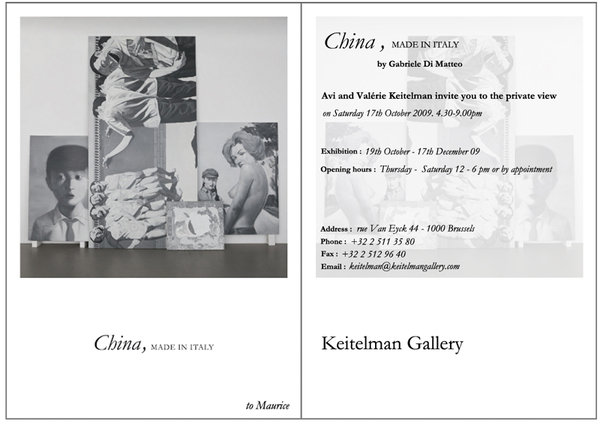Gabriele Di Matteo
dal 16/10/2009 al 16/12/2009
Segnalato da
16/10/2009
Gabriele Di Matteo
Keitelman Gallery, Bruxelles
China Made in Italy. This collection of black and white canvases reproducing the works of highly sought-after contemporary Chinese artists, is installed casually upon the floor, as in an artist's studio, seemingly beckoning an avid onlooker's gaze, poised as though for imminent purchase.

To inaugurate its new show space before renovation, the Keitelman Gallery proudly hosts Italian artist Gabriele Di Matteo who will be introducing his compelling new series China – Made in Italy.
This collection of black and white canvases reproducing the works of highly sought-after contemporary Chinese artists, is installed casually upon the floor, as in an artist’s studio, seemingly beckoning an avid onlooker’s gaze, poised as though for imminent purchase.
Presenting simultaneously Europalia Chine, this show speaks out in a new, critical voice. For the past number of years, Gabriel Di Matteo has been engrossed in thoughtful critique surrounding the status of images, the notion of copy write and of what it means to be an original. In his work, Di Matteo has embraced appropriation and reproduction, drawing from a formal and broad-ranged repertoire of media—photography, painting, films or iconic images. There is a clear logic to being the object of reproduction: each image is painted and repainted by the artist until it out-vivifies the original. Di Matteo does just that as he puts his own selection of images to the test.
Reduced to stereotype through endless reproduction, an image will exhaust itself into near-extinction, achieving, in the words of artist Gloria Friedmann “the perfect murder.” The process whereby a copy actually kills the original, to the point of becoming ‘the original’ lies both at the heart of a new imaginary world order, and at the centre of a conundrum which the art world deals with daily.
With China-Made in Italy Di Matteo claims the part of official pirate, namely by copying iconic, contemporary Chinese paintings. The most renown being works by Zhang Xiaogang, Fen Zhengjie, and Wang Guangyi, all rendered in black and white pastiche. Through their unheard of presentation and wildly altered colours, these canvases tout their unequivocal falseness. Hammering home the message that no copy is ever perfect, Di Matteo celebrates the fact that the opposition between true and false is today blurred in exciting new ways. A dialectic tension lies thick between the original and the copy, between author and artist, or artisan. Could we be witnessing a whole dance of interchangeability, calling our values into question? And what role does art actually play in the creation of copies, when the original can no longer be pinpointed?
Beyond gently parodying the speculative spiral that characterizes today’s art market, China-Made in Italy provides a glimpse of some yet-unchartered avenues of meaning. These span the fetishism surrounding the merchandising of art, the odd power conferred upon a work of art by virtue of its having “commercial” or even “political” value, cloning, authors’ prerogatives, and obviously the edgy reference to history being turned on its head (Made in China morphs into China – Made in Italy). Tiptoeing in Duchamp’s footsteps, Di Matteo wreaks his own havoc. Challenging our very take on reality with a critical tone, the artist leads us to question the authority an image exerts and, as importantly, our very own markers and reference points.
This exhibition is dedicated to the memory of my uncle, Maurice Keitelman.
Opening: 17 october 4.30 pm - 9 pm
Keitelman Gallery
44 Rue Van Eyck - Bruxelles
Admission free



